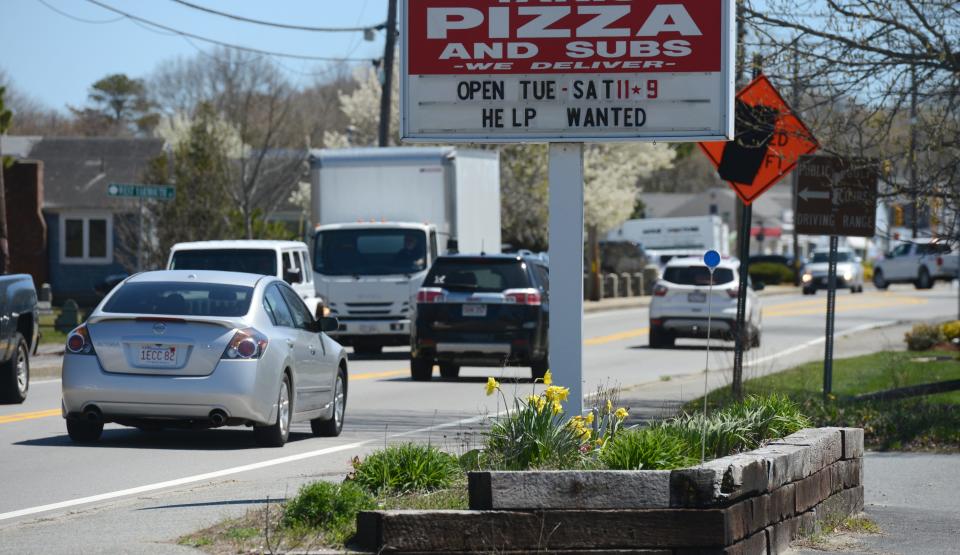OPINION: In the face of Cape staffing shortages, kindness can go a long way
We’ve all seen the signs in shops and restaurants: “We are short of staff, so serving you may take a little longer.” Or if trying to contact a company by phone, we hear, “We are experiencing a larger-than-normal volume of calls, and we are working hard to fill staff vacancies, so please be patient as you wait.”
Often, the automated systems will then tell you the “approximate wait time” for your call to be answered. One company I called last week told me to expect a wait time of one-and-a-half hours!
Another sign of the times: what retail shop, grocery store, restaurant, gas station, home improvement business or electronics purveyor does NOT have a sign up saying “Join our team!” or “We are hiring, apply now!”? That’s right: none.

Anyone trying to get a home renovation or landscaping project done has experienced a contractor who explains delays with the inability to find enough workers. Long lines at the movie theater are blamed on lack of sufficient staff. Hospitals are short of nurses. And the list goes on, touching virtually every sector of the economy.
We’re told that staff shortages are driving increases in wages, and yet, the dearth of workers persists. According to USA Today, Julia Pollack, the chief economist at the job search service Zip Recruiter, said this year’s college graduates are experiencing a “feeding frenzy” by employers eager to fill their staff vacancies. She noted there are about two vacant jobs for every one unemployed person.
More: College grads are snaring high-paying jobs. How the labor shortage made way for better benefits.
What’s going on here?
Some blame it on the pandemic. It is true that COVID-19, and fears of COVID-19, caused massive shifts in the landscape of work here in the U.S. (and likely across the globe). Many people took a route that felt safer, namely early retirement.
One case I know of here in Barnstable involved a shop owner whose wife was a teacher. She could not get to a level of comfort with online teaching and took early retirement. He then decided it was time to sell the store, and he, too, retired. Multiply that story a thousand times.
Others quit jobs that felt unsafe, under-appreciated, even insulting. Put many restaurant servers in that category. Horror stories abound about rude treatment by the public – being subjected, for instance, to angry tirades over mask-wearing rules.
From the archives: Cape Cod visitors urged to 'pack their patience'
Still others decided to start their own businesses. Economist Ben Casselman, writing for the New York Times in February 2021, reported on a study at the Peterson Institute for International Economics that revealed 4.4 million new businesses were created in 2020, a 24 percent increase over the previous year.
Another factor that hasn’t been mentioned much is that the largest generation in U.S. history, the “baby boomers” have been moving into retirement at rapid rates for the past decade, and the pandemic accelerated it.
Replacing all of them in the workforce is stymied by the fact that every generation since has been smaller. Birth rates in the U.S. have been decreasing. We simply do not have enough replacements coming in to fill the vacancies created by all the baby boomers retiring.
More: Joanne Guertin retiring, closing Robert E. Guertin Jeweler in Sandwich after 50 years
So what are the solutions?
For one thing, I think we can expect increasing automation. More and more, businesses encourage us to go to their websites to get the answers to our questions, rather than wait to speak to a human employee. More and more, we are encouraged to go to electronic billing and automatic electronic payments – no longer must employees stuff envelopes, get them stamped, and then open the returned envelopes and process paper checks.
The bank ATM machines, automated parking fee collectors, online airline and hotel reservations – these are just the beginning. Human labor shortages will result in more machines doing our work, and more shifting of work from the employees of a business to the customers of the business.
More: Cape's small business owners say labor, housing, services are needed
Increased automation, however, will not completely solve the problem. It’s hard to imagine a robot delivering a beer and a burger to my table in a crowded restaurant! Here’s where the “kindness imperative” comes in.
We need to remember that the staff who serve us in numerous public settings are operating under difficult circumstances – too many tables to cover, too many customers wanting attention, too many lawns that need mowing, too many toppled trees to tend after a major storm. Venting our frustration at the worker in front of us will not help the situation.
In the words of Ralph Waldo Emerson, “You cannot do kindness too soon, for you never know how soon it will be too late.”
Escape the Cape: Try our four little cities tour
Even better, Mother Teresa points to results: “Spread love wherever you go. Let no one ever come to you without leaving happier.”
If “community counts,” then kindness should come easily.
Kathleen Schatzberg is a former president of Cape Cod Community College. She can be found on Facebook and Twitter. Her monthly column chronicles community building on Cape Cod.
This article originally appeared on Cape Cod Times: OPINION: With Cape Cod labor shortage, kindness can help

